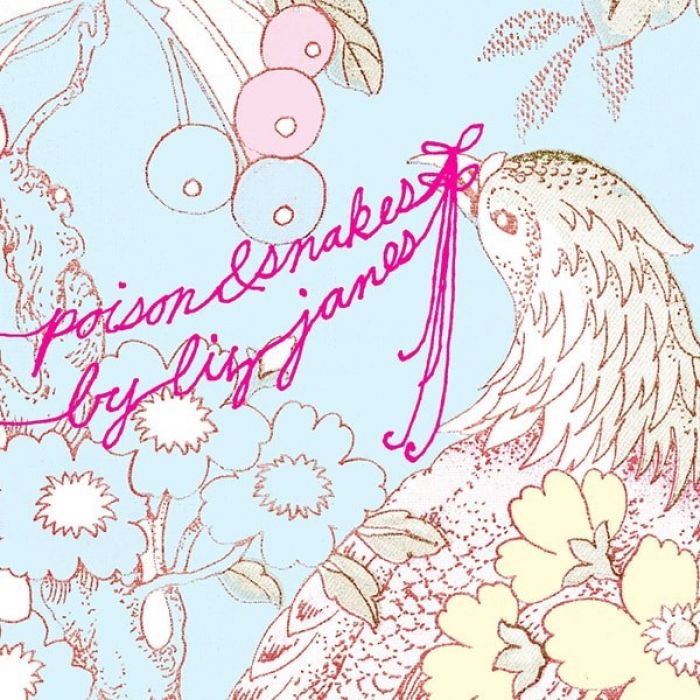Poison & Snakes by Liz Janes (Review)

I’m not sure if I should admit this, but these days, I’ve found it increasingly hard to listen — and I mean really listen — to CDs. A few years ago, it was not unusual for me to spend hours lying on the floor, doing absolutely nothing but opening myself up to a particular CD and letting it fill my heart, mind, and soul. But these days, I feel harried and distracted, and it’s just more difficult for me to block off hours to do nothing but just listen, and I mean really listen.
If you simply listen to Liz Janes’ Poison & Snakes, you’ll only hear the mere tip of the iceberg. It’ll come across as an album that sounds like yet another lo-fi singer/songwriter getting together with a bunch of friends to record some folksy Americana with a few quirks thrown in here and there. Really listening to Poison & Snakes, however, reveals an absolutely stunning album that unfolds like a musical patchwork quilt.
At first listen, the album feels incredibly uneven, jumping and lurching drunkenly from style to style, with all manner of instrumentation strewn about like tornado debris. However, closer listening reveals that each song is a tiny world unto itself, full of its own intricate little details. And yet the whole album retains an amazing coherence and consistency, thanks to Janes’ voice and lyrics.
Which explains why the album can move from ’50s girl-group numbers to Depression-era carnival sounds, from graceful, moonlit ballads to atmospheric tone poems with nary a break in stride, and yet can come together with only the slightest of bumps and jars. And that’s just between the individual songs. Within the songs are an amazing and staggering array of sounds, thanks in part to the thirteen contributors (including members of The Castanets, The Black Heart Procession, and Soul-Junk) who back Janes.
“Wonderkiller” starts things off on a slightly dreamy, ’50s vibe, as Janes sings of being ditched by her latest lover and returning to God, her true love (“Tremble at my true love’s promise/You are not my true love/His promise is not my dependent upon my belief/But upon His word only”). However, that doesn’t prevent Jane from pairing the starry-eyed girl-group harmonies with smoldering guitars.
The heart and soul of “Poison & Snakes” lies somewhere in the deep South, with its lyrics of conviction and sin (“I’ll walk there until the day that I die/‘Cause without you I’m all poision/The things I do all turn to snakes/It’s all snakes without you/Without you it all goes to trouble”) and Janes’ sultry voice. Musically, it merges church organs with circus accordions, while the harmonicas and slide guitar stare off somewhere to the West.
“Vine” also taps into a Southern spirituality, though this time, the song captures such passion in the music. Although it starts off rather slowly and hesitantly, when the song finally erupts in a torrent a crashing drums and fiery guitars, it does so like the whirlwind that knocked Job flat. Janes does her best to stay afloat, to keep her head above the flood, screaming “I want to be a vine/I’ll bear fruit for the king.”
Although Janes is quite at home with simple songs — “Sets To Cleaning” tells of a lonely housewife with stark guitars, hollow percussion, and a ghostly saw while Janes voices the anxiety of new parents with little more than a ukulele on “Baby Song” — Poison & Snakes is most exciting and inspiring when it’s also at it’s most sprawling and seemingly uneven. However, this sprawling and meandering gives Janes and her contributors plenty of time and space in which to move and breathe, lending the tracks some remarkable grace.
“Ocean” is perhaps the album’s softest moment, as Janes’ vocals meander along with scattered percussion and plucked guitars. But an aching cello occasionally slides below the surface, and eventually lifts the song up, the change happening so uncannily it’s almost spiritual. Slowly the song moves to a new place, with Janes’ layered voice delicately singing “Rapture,” not ecstatically, but rather with a cool sense of peace and relief.
However, everything Janes does on the album is merely a precursor to “Desert.” In fact, “Desert” seems like such a perfect summation of Janes’ talent and vision that it’s almost a disservice to the tracks that follow it. Beginning with a few sparse piano notes and falsetto vocals that imply something a bit more lighthearted, the song simply opens up from there and never once looks back. Slowly strummed guitars, vibes, cello, and Jason Crane’s relaxed trumpet begin painting the picture of an expansive new land to explore.
It’s the sort of song that seems perfectly suited for every single roadtrip you’ll ever make in your life, for every time you venture anywhere close to the interstate. And yet at the same time, I don’t feel like I ever need to leave my driveway ever again. While listening to “Desert,” I can see every highway I’ve driven down in my mind’s eye, every blurred farm field I’ve passed, every cloudless blue sky I’ve travelled under.
Asthmatic Kitty has been having a banner year so far. Label co-founder Sufjan Stevens has blown up in ways no one could’ve foreseen, The Castanets have been receiving boatloads of accolades (including a hugely positive Pitchfork review), and now Liz Janes delivers even more on the promise and talent hinted at in her debut. However, Janes’ music is even less readily apparent than that of her labelmates. But those who are patient and dedicated will find a world of riches within these 44 minutes.